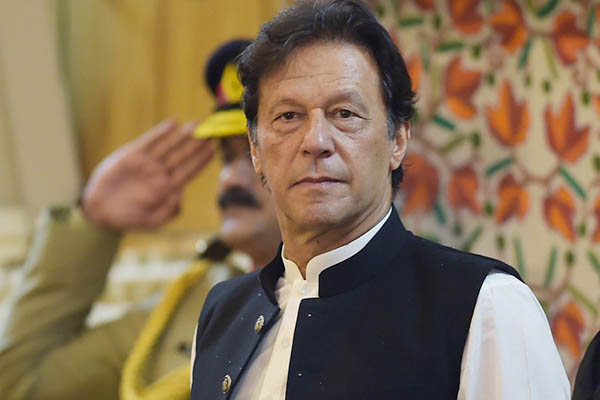
File photo of Prime Minister Imran Khan. Aamir Qureshi—AFP
In interview with CNN, premier claims global community has no choice but to work with the Taliban government in Afghanistan
The U.S.-led “war on terror” bred more terrorists due to the civilian casualties caused by drone strikes, Prime Minister Imran Khan claimed on Sunday, as he urged the global community to stop trying to “pressure” the Taliban-led government in Afghanistan to fulfill its human rights commitments.
“We [Pakistan] saw that as the war [on terror] went on it produced more terrorists and I am convinced it was exactly the same to what happened in Afghanistan due to the night raids in Afghanistan, the drone attacks,” he told CNN’s Fareed Zakaria in an interview. “We watched what happened there. They were telling people in the United States that the drones were very accurate and they actually got the terrorists,” he said, lamenting that the strikes had caused a lot of collateral damage.
“We bore the brunt because what happened was, we were considered the collaborators of the U.S. so all the revenge attacks were against the Pakistani soldiers and against the people of Pakistan. There were suicide attacks occurring all over the country and we lost 80,000 people,” he added.
To a question on how this explained the continuation of terror attacks following the U.S. withdrawal from Afghanistan in August 2021, Khan claimed the attacks were now “much less” and “terrorism is almost insignificant now.”
No alternative
Discussing the situation in Afghanistan, the prime minister claimed that “squeezing” the Taliban government would not produce any change for the better. “The only alternative we have right now is to work with them [Taliban] and incentivize them for what the world wants—inclusive government, human rights and women rights in particular,” he said, claiming that if the Taliban were “abandoned” and sanctions imposed on them, it risked Afghanistan descending into chaos and provoking a humanitarian crisis.
Khan said Pakistan faced two major challenges—refugees and terrorism—due to instability in neighboring Afghanistan. Despite statements to the contrary from Interior Minister Sheikh Rashid Ahmed, he claimed that following the Taliban takeover of Kabul, almost 250,000 Afghans had crossed into Pakistan and “amongst them unfortunately were terrorists.” This also contrasts with claims of government officials that the Taliban had assured them that Afghan soil would not be used against Pakistan by any terror groups.
“There were these Pakistani Taliban which had conducted attacks inside Pakistan, there were the Baloch insurgents who were conducting attacks especially recently and then there was ISIL,” said Khan of the three terror groups operating against Pakistan from Afghanistan. “Our best hope is that a stable Afghanistan will ensure peace and stability of Pakistan,” he said.
To a question, the prime minister said the world would have to recognize the Taliban government eventually. “The world wants some guarantees before they recognize the Taliban; so how far is the U.S. going to push the Taliban to actually conform them to what they expect them to do in terms of human rights?” he questioned, maintaining that the Taliban represent a culture that is completely alien to western societies.
“There has to be give and take,” he said. “By not recognizing them and freezing their accounts and the banking system, only people are going to suffer, and not the Taliban government because no one can replace them right now. So what is happening is that half of the Afghan population, about 20 million people are at a severe risk,” he claimed, reiterating warnings of a looming humanitarian crisis.
“There is hunger and the Afghan winter is extremely wicked, ruthless,” he stressed.
China and India
Journalist Zakaria, during the interview, asked Khan about his views on China’s alleged mistreatment of Muslims in Xinjiang. The prime minister said that Pakistan’s ambassador to China had visited Xinjiang and reported that the situation was not in line with what was being reported by Western media. Deflecting the question, he questioned why there wasn’t equal indignation about India’s treatment of Kashmiris in India-held Jammu and Kashmir.
“Over the last 35 years, approximately 100,000 Kashmiris have died,” he said, adding that in 2019 India unilaterally revoked the region’s special constitutional status. “There are extrajudicial killings. There are no rights, there are clampdowns; 800,000 Indian troops in the valley,” he said, lamenting that the Kashmir issue “did not get the attention it deserved.”
To a question on whether he believed Muslims in Kashmir were treated worse than Muslims in Xinjiang, Khan claimed there was “absolutely no comparison,” while admitting that he “had only one source” of Pakistan’s ambassador to China. Referring to rifts between China and the U.S., he said it appeared the world was headed toward a new Cold War and Washington’s statement were in direct contradiction to those of Beijing.
“So who do you believe? That’s why we asked our ambassador to give us his opinion and it is not what is appearing in Western media,” he reiterated.
Talking about Pakistan’s relations with India, the prime minister said he knows “India better than anyone else,” as he has “many” friends there. “As soon as I became the prime minister of Pakistan, I approached India and offered to make things right between the two countries and establish better relations,” he said. “I told P.M. Narendra Modi if he took one step forward, I would take two,” he said, regretting that India has “fallen prey to RSS ideology.”
